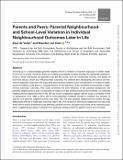Parents and peers : parental neighbourhood- and school-level variation in individual neighbourhood outcomes later in life
Abstract
Growing up in a disadvantaged parental neighbourhood is related to long-term exposure to similar neighbourhoods as adults. However, there are multiple socio-spatial contexts besides the residential neighbourhood to which individuals are exposed over the life course, such as households, schools, and places of work and leisure, which also influence their outcomes. For children and adolescents, the school environment is especially important. We argue that leaving these contexts out of consideration in models of neighbourhood effects could lead to a misspecification of the relevance of the residential environment in determining individual outcomes. This study examines the joint influence of the parental background, the parental neighbourhood, and a compositional measure of the childhood school environment, on individual neighbourhood trajectories later in life. We use Dutch longitudinal register data to study a complete cohort of adolescents from 1999 to 2012. We fit cross-classified multilevel models in order to partition the variance of schools and parental neighbourhoods over time. We find that parental neighbourhood quality strongly determines children’s residential outcomes later in life. The variation in individual neighbourhood outcomes at the school-level is explained by the ethnicity, parental income and personal income of the research population, suggesting grouping of children from particular backgrounds into specific school environments.
Citation
Vuijst , E D & van Ham , M 2019 , ' Parents and peers : parental neighbourhood- and school-level variation in individual neighbourhood outcomes later in life ' , European Sociological Review , vol. 35 , no. 1 , pp. 15-28 . https://doi.org/10.1093/esr/jcy041
Publication
European Sociological Review
Status
Peer reviewed
ISSN
0266-7215Type
Journal article
Description
The research leading to these results has received funding from the European Research Council under the European Union's Seventh Framework Programme (FP/2007-2013) / ERC Grant Agreement n. 615159 (ERC Consolidator Grant DEPRIVEDHOODS, Socio-spatial inequality, deprived neighbourhoods, and neighbourhood effects).Collections
Items in the St Andrews Research Repository are protected by copyright, with all rights reserved, unless otherwise indicated.

